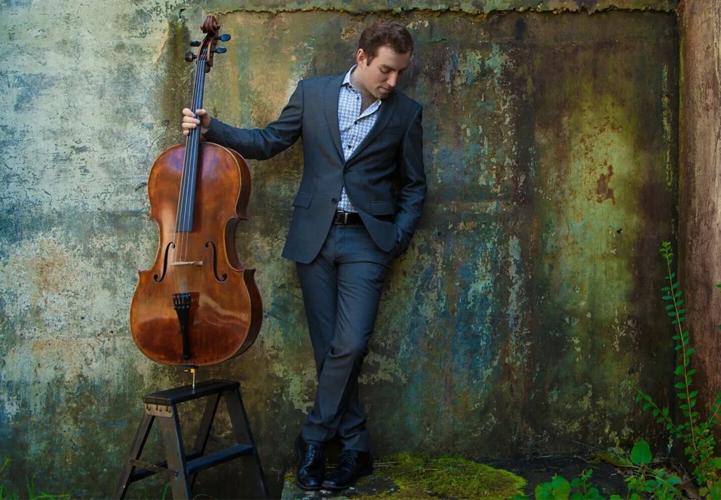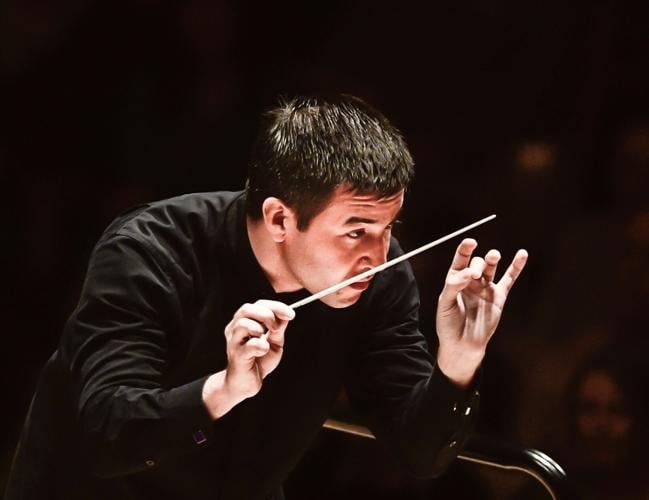In classical music programming, common wisdom suggests that you sprinkle something exciting and new in with the tried and true.
On Friday night, in the first of two performances of its ŌĆ£Haydn and BrahmsŌĆØ concert at Linda Ronstadt Music Hall, Tucson Symphony Orchestra went the distance with that philosophy.
We got a talented new-to-us guest conductor leading the orchestra in gems by Mozart, Haydn and Brahms alongside a dramatic new work weŌĆÖd never heard before performed by a guest soloist we were just introduced to in November.
And then there was the surprise: The return of the former TSO concertmaster Steven Moeckel sitting in his old seat.
We havenŌĆÖt seen Moeckel in that chair since he left us for the Phoenix Symphony in 2008.
The orchestra has been hosting guest concertmasters since Concertmaster Lauren Roth took a sabbatical this season after landing the assistant concertmaster role with the Atlanta Symphony in Georgia.
People are also reading…
Seeing Moeckel on the Music Hall stage was a bonus for longtime TSO audience members. His hair isnŌĆÖt the shock of wavy brown that it was when he landed here in 2002 at age 24, but his musicianship is just as invigorating and dynamic as we remember.
From our place in the audience, it seemed Cuban-American cellist Tommy Mesa, the TSOŌĆÖs artist in residence, immediately connected with Moeckel in the concertŌĆÖs centerpiece, HaydnŌĆÖs Cello Concerto No. 1. Mesa rocked gently in his seat, smiling as Moeckel led the strings in HaydnŌĆÖs delightful exposition before Mesa gave Tucson a masterclass in virtuosic playing.
He glided through HaydnŌĆÖs frenetically-paced note changes, fingers dancing in a blur as he brought out the contrasting low notes high on the fingerboard and the high notes summoned near the bridge.
Guest conductor Francesco Lecce-Chong, making his TSO debut, was careful not to let the pace get too undaunting. He kept the tempo just fast enough to emphasize the contrasting melodies and MesaŌĆÖs sterling intonation.
Mesa gave the orchestra a two-fer Friday night when he introduced us to Jessie MontgomeryŌĆÖs ŌĆ£DividedŌĆØ for solo cello and orchestra written for him in 2022.
The dramatic work plays out like an angry conversation by people unwilling to find common ground. It opens with MesaŌĆÖs cello softly pleading then growing more desperate as Mesa drew the bow sharply once, twice, almost in an angry fit.
When Moeckel and the strings pick up the motif, it sounds more mocking than reassuring, leading to more frenetic play from Mesa.
The piece devolves into what can best be described as a shouting match; the strings gang up on the solo cello, taunting it. Mesa tries to get a word in only to be drowned out as the strings and solo cello go off in different directions at crazy fast tempos until MesaŌĆÖs cello silences them with impressive virtuosic acrobatics leading to a stirring climax.
In the BrahmsŌĆÖ D-major Symphony No. 2 anchoring the program, Lecce-Chong brought out the contrasts of the composerŌĆÖs elegant beauty and crushing despair in the second movement with the playful interludes of the fourth before teasing us with flashes of Brahms eventual explosive conclusion.
Mesa will make his final appearance as artist-in-residence on Sunday, when the orchestra performs “Haydn and Brahms” at 2 p.m. at Music Hall, 260 S. Church Ave. For tickets and details, visit .











